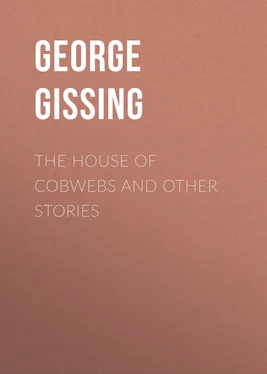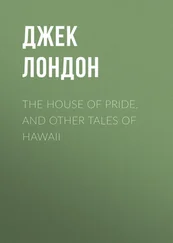George Gissing - The House of Cobwebs and Other Stories
Здесь есть возможность читать онлайн «George Gissing - The House of Cobwebs and Other Stories» — ознакомительный отрывок электронной книги совершенно бесплатно, а после прочтения отрывка купить полную версию. В некоторых случаях можно слушать аудио, скачать через торрент в формате fb2 и присутствует краткое содержание. Жанр: foreign_prose, literature_19, foreign_antique, на английском языке. Описание произведения, (предисловие) а так же отзывы посетителей доступны на портале библиотеки ЛибКат.
- Название:The House of Cobwebs and Other Stories
- Автор:
- Жанр:
- Год:неизвестен
- ISBN:нет данных
- Рейтинг книги:5 / 5. Голосов: 1
-
Избранное:Добавить в избранное
- Отзывы:
-
Ваша оценка:
- 100
- 1
- 2
- 3
- 4
- 5
The House of Cobwebs and Other Stories: краткое содержание, описание и аннотация
Предлагаем к чтению аннотацию, описание, краткое содержание или предисловие (зависит от того, что написал сам автор книги «The House of Cobwebs and Other Stories»). Если вы не нашли необходимую информацию о книге — напишите в комментариях, мы постараемся отыскать её.
The House of Cobwebs and Other Stories — читать онлайн ознакомительный отрывок
Ниже представлен текст книги, разбитый по страницам. Система сохранения места последней прочитанной страницы, позволяет с удобством читать онлайн бесплатно книгу «The House of Cobwebs and Other Stories», без необходимости каждый раз заново искать на чём Вы остановились. Поставьте закладку, и сможете в любой момент перейти на страницу, на которой закончили чтение.
Интервал:
Закладка:
Few, if any, of Gissing's books exhibit more mental vigour than In the Year of Jubilee . This is shown less, it may be, in his attempted solution of the marriage problem (is marriage a failure?) by means of the suggestion that middle class married people should imitate the rich and see as little of each other as possible, than in the terse and amusing characterisations and the powerfully thought-out descriptions. The precision which his pen had acquired is well illustrated by the following description, not unworthy of Thomas Hardy, of a new neighbourhood.
'Great elms, the pride of generations passed away, fell before the speculative axe, or were left standing in mournful isolation to please a speculative architect; bits of wayside hedge still shivered in fog and wind, amid hoardings variegated with placards and scaffoldings black against the sky. The very earth had lost its wholesome odour; trampled into mire, fouled with builders' refuse and the noisome drift from adjacent streets, it sent forth, under the sooty rain, a smell of corruption, of all the town's uncleanliness. On this rising locality had been bestowed the title of "Park." Mrs. Morgan was decided in her choice of a dwelling here by the euphonious address, Merton Avenue, Something-or-other Park.'
Zola's wonderful skill in the animation of crowds has often been commented upon, but it is more than doubtful if he ever achieved anything superior to Gissing's marvellous incarnation of the jubilee night mob in chapter seven. More formidable, as illustrating the venom which the author's whole nature had secreted against a perfectly recognisable type of modern woman, is the acrid description of Ada, Beatrice, and Fanny French.
'They spoke a peculiar tongue, the product of sham education and a mock refinement grafted upon a stock of robust vulgarity. One and all would have been moved to indignant surprise if accused of ignorance or defective breeding. Ada had frequented an "establishment for young ladies" up to the close of her seventeenth year: the other two had pursued culture at a still more pretentious institute until they were eighteen. All could "play the piano"; all declared—and believed—that they "knew French." Beatrice had "done" Political Economy; Fanny had "been through" Inorganic Chemistry and Botany. The truth was, of course, that their minds, characters, propensities, had remained absolutely proof against such educational influence as had been brought to bear upon them. That they used a finer accent than their servants, signified only that they had grown up amid falsities, and were enabled, by the help of money, to dwell above-stairs, instead of with their spiritual kindred below.'
The evils of indiscriminate education and the follies of our grotesque examination system were one of Gissing's favourite topics of denunciation in later years, as evidenced in this characteristic passage in his later manner in this same book:—
'She talked only of the "exam," of her chances in this or that "paper," of the likelihood that this or that question would be "set." Her brain was becoming a mere receptacle for dates and definitions, vocabularies and rules syntactic, for thrice-boiled essence of history, ragged scraps of science, quotations at fifth hand, and all the heterogeneous rubbish of a "crammer's" shop. When away from her books, she carried scraps of paper, with jottings to be committed to memory. Beside her plate at meals lay formulae and tabulations. She went to bed with a manual, and got up with a compendium.'
The conclusion of this book and its predecessor, The Odd Women , 20 20 The Odd Women (1893, new edition, 1894) is a rather sordid and depressing survey of the life-histories of certain orphaned daughters of a typical Gissing doctor—grave, benign, amiably diffident, terribly afraid of life. 'From the contact of coarse actualities his nature shrank.' After his death one daughter, a fancy-goods shop assistant (no wages), is carried off by consumption; a second drowns herself in a bath at a charitable institution; another takes to drink; and the portraits of the survivors, their petty, incurable maladies, their utter uselessness, their round shoulders and 'very short legs,' pimples, and scraggy necks—are as implacable and unsparing as a Maupassant could wish. From the deplorable insight with which he describes the nerveless, underfed, compulsory optimism of these poor in spirit and poor in hope Gissing might almost have been an 'odd woman' himself. In this book and The Paying Guest (1895) he seemed to take a savage delight in depicting the small, stiff, isolated, costly, unsatisfied pretentiousness and plentiful lack of imagination which cripples suburbia so cruelly.—See Saturday Review , 13 Apr. 1896; and see also ib ., 19 Jan. 1895.
marks the conclusion of these elaborated problem studies. The inferno of London poverty, social analysis and autobiographical reminiscence, had now alike been pretty extensively drawn upon by Gissing. With different degrees of success he had succeeded in providing every one of his theses with something in the nature of a jack-in-the-box plot which the public loved and he despised. There remained to him three alternatives: to experiment beyond the limits of the novel; to essay a lighter vein of fiction; or thirdly, to repeat himself and refashion old material within its limits. Necessity left him very little option. He adopted all three alternatives. His best success in the third department was achieved in Eve's Ransom (1895). Burrowing back into a projection of himself in relation with a not impossible she, Gissing here creates a false, fair, and fleeting beauty of a very palpable charm. A growing sense of her power to fascinate steadily raises Eve's standard of the minimum of luxury to which she is entitled. And in the course of this evolution, in the vain attempt to win beauty by gratitude and humility, the timid Hilliard, who seeks to propitiate his charmer by ransoming her from a base liaison and supporting her in luxury for a season in Paris, is thrown off like an old glove when a richer parti declares himself. The subtlety of the portraiture and the economy of the author's sympathy for his hero impart a subacid flavour of peculiar delicacy to the book, which would occupy a high place in the repertoire of any lesser artist. It well exhibits the conflict between an exaggerated contempt for, and an extreme susceptibility to, the charm of women which has cried havoc and let loose the dogs of strife upon so many able men. In The Whirlpool of 1897, in which he shows us a number of human floats spinning round the vortex of social London, 21 21 The whirlpool in which people just nod or shout to each other as they spin round and round. The heroine tries to escape, but is drawn back again and again, and nearly submerges her whole environment by her wild clutches. Satire is lavished upon misdirected education (28), the sluttishness of London landladies, self-adoring Art on a pedestal (256), the delegation of children to underlings, sham religiosity (229), the pampered conscience of a diffident student, and the mensonge of modern woman (300), typified by the ruddled cast-off of Redgrave, who plays first, in her shrivelled paint, as procuress, and then, in her naked hideousness, as blackmailer.
Gissing brings a melodramatic plot of a kind disused since the days of Demos to bear upon the exhausting lives and illusive pleasures of the rich and cultured middle class. There is some admirable writing in the book, and symptoms of a change of tone (the old inclination to whine, for instance, is scarcely perceptible) suggestive of a new era in the work of the novelist—relatively mature in many respects as he now manifestly was. Further progress in one of two directions seemed indicated: the first leading towards the career of a successful society novelist 'of circulating fame, spirally crescent,' the second towards the frame of mind that created Ryecroft . The second fortunately prevailed. In the meantime, in accordance with a supreme law of his being, his spirit craved that refreshment which Gissing found in revisiting Italy. 'I want,' he cried, 'to see the ruins of Rome: I want to see the Tiber, the Clitumnus, the Aufidus, the Alban Hills, Lake Trasimenus! It is strange how these old times have taken hold of me. The mere names in Roman history make my blood warm.' Of him the saying of Michelet was perpetually true: 'J'ai passé à côté du monde, et j'ai pris l'histoire pour la vie.' His guide-books in Italy, through which he journeyed in 1897 ( en prince as compared with his former visit, now that his revenue had risen steadily to between three and four hundred a year), were Gibbon, his semper eadem , Lenormant ( la Grande-Grèce ), and Cassiodorus, of whose epistles, the foundation of the material of Veranilda , he now began to make a special study. The dirt, the poverty, the rancid oil, and the inequable climate of Calabria must have been a trial and something of a disappointment to him. But physical discomfort and even sickness was whelmed by the old and overmastering enthusiasm, which combined with his hatred of modernity and consumed Gissing as by fire. The sensuous and the emotional sides of his experience are blended with the most subtle artistry in his By the Ionian Sea , a short volume of impressions, unsurpassable in its kind, from which we cannot refrain two characteristic extracts:—
Интервал:
Закладка:
Похожие книги на «The House of Cobwebs and Other Stories»
Представляем Вашему вниманию похожие книги на «The House of Cobwebs and Other Stories» списком для выбора. Мы отобрали схожую по названию и смыслу литературу в надежде предоставить читателям больше вариантов отыскать новые, интересные, ещё непрочитанные произведения.
Обсуждение, отзывы о книге «The House of Cobwebs and Other Stories» и просто собственные мнения читателей. Оставьте ваши комментарии, напишите, что Вы думаете о произведении, его смысле или главных героях. Укажите что конкретно понравилось, а что нет, и почему Вы так считаете.












